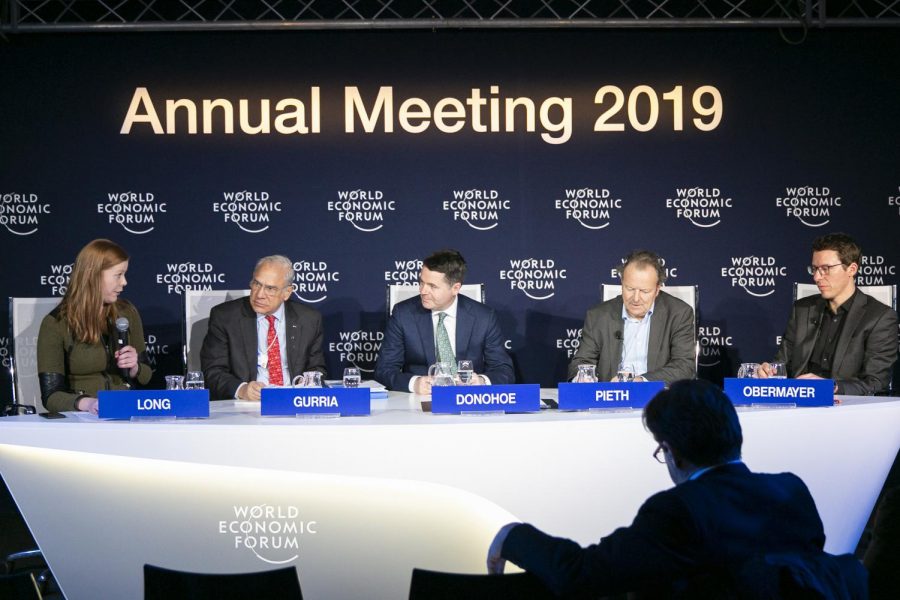President Trump wrongly cancelled his delegation to the Davos World Economic Forum
OECD Organisation for Economic Co-operation, flickr.com, Creative Commons
Heather Long, Economics Correspondent, Washington Post, USA, Angel Gurría, Secretary-General, Organisation for Economic Co-operation and Development (OECD), Paris, Paschal Donohoe, Minister for Finance of Ireland, Mark Pieth, Chairman of the Board, Basel Institute on Governance, Switzerland and Bastian Obermayer, Head of Investigation, Süddeutsche Zeitung, Germany meet in the Media Village Issue Briefing Room for a session entitled “Rethinking Taxes: Creating a Fair and Balanced System” at the Annual Meeting 2019 of the World Economic Forum in Davos, January 24, 2019.
February 17, 2019
The 2019 Davos World Economic Forum was in full swing from January 22 through January 25, with the theme of ‘Globalization 4.0.’ Globalization refers to the way the world is steadily growing more and more interconnected, with transnational businesses holding locations in multiple nations and increasing international trade. Davos hosts attendees that range from Chinese e-commerce giant Alibaba’s co-founder, Jack Ma, to the United Kingdom’s Prince William. One of the biggest issues on the table, right alongside climate change, is the concern of a slowing global economy.
As worries about the slowing global economy persist, two issues are at the forefront: China’s slowing economy, and the United State’s partial government shutdown. It is understandable, then, why China sent a large delegation to the forum: they want to reassure the rest of the world that their slowing growth is actually inconsequential. In all reality, they are still growing faster than the U.S., their economy is diversifying, and their debt is slowing (via).
But with China in attendance and the U.S. absent, they’re offering a one-sided view of the U.S.-China trade war. As they make their own economy look strong, the U.S. looks much worse––especially since economic troubles due to the partial government shutdown are a main reason that the U.S. could not attend in the first place. Since the trade war has been referred to as “the key problem of our time,” it was especially poor planning for Trump and the U.S. delegation to be absent for any global talks about the issue.
And, of course, China now has the opportunity to promote itself as a country dedicated to globalization–completely unchallenged.
This could easily lead to an acceleration of China’s Belt and Road Initiative, which many worry could allow partial Chinese hegemony over many developing areas in Africa and southern Asia. All in all, without the U.S. at Davos, China’s path to globalization and development is the only real option that many will see.
Besides China, missing this year’s Davos is daunting for the U.S. simply because of its theme: Globalization 4.0. Trump’s fiery rhetoric of “America First” has had the international community worried that his economic strategy will be too protectionist; something that he has already shown with his enormous tariffs, revamped trade deals, and the trade war with China. Staying away from the world forum is like telling the rest of the world that Trump (and thus all of America) is opposed to making global trade more integrated.
It’s not just speculation, either; people have noticed this. German Chancellor Angela Merkel’s address at Davos included a thinly veiled condemnation of Trump’s America First. She said that she had “grave doubts” that a protectionist, ‘our-country-first’ policy is “the right way to go about it.”
In skipping Davos 2019, Trump made it far too easy for his economic rival, China, to present whatever case they wanted with no challenge whatsoever. Even if the trade war is excessive, Trump now has no real way to legitimize his case in front of the rest of the world. It was also a particularly bad play because it opened him up to rebuke from world leaders who already question President Trump’s commitment to globalization.


















































